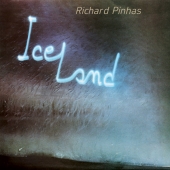
Pinhas Richard
Iceland
Label: Bureau B
Genre: 60s / 70s Rock / Pop / Progressive / Kraut
Availability
- LP €26.99 In Stock
Bureau B is grateful to make this Richard Pinhas album finally available again.
Years ago I sent a friend Metatron/Shaddaï/Chabbataï, one of my favourite ever pieces of music. He replied ‘One marvels at how much time and care this must’ve taken’. Which is true for all Richard Pinhas’ recordings. Even here, in its absolute starkness - ‘Iceland’ is the perfect description of this music - when you start to focus on the details contained within these juggernauts of atmosphere, you sense the precision involved with each element, its place in the mix meticulously chosen.
Despite the nature of the sounds, there is nothing cold about Pinhas’ appreciation of the record. Enthusing over aspects of how he made certain tracks - recording with his first ARP 2600, using ‘white noise as the source!...creating these very special voices’, playing his original 1957 Black Beauty Les Paul, and how François Auger’s fantastic drumming ‘enlightens Greenland’ with his softness of touch. For a man often critical of his own work, Pinhas tells me that he ‘loves’ Iceland, that it ranks in the top 5 of his records. ‘Cold music was and still is the goal.’
I must confess I don’t know what to make of this last statement. ‘Cold’ isn’t a word I normally associate with Pinhas’ music. The best of it, Metatron etc., mesmerizes with transcendent grace, or, as in the case of Washington D.C. from 2014’s phenomenal collaboration with Oren Ambarchi, Tikkun, sweeps you along with the sheer awesomeness - in the truest meaning of the word - of its power. There are countless other examples. And always, no matter which Pinhas track you’re listening to, at some point you’re usually thinking ‘this sounds so freaking cool!’
But Iceland is precisely ‘cold’. An unflinching look at the bleakness of the landscapes glimpsed. But it is through that refusal to shut off one’s senses, that their true majesty is revealed. A ghostly homing sound beckons as Iceland 2 begins. Our guide leading us into the terrain is an uneasy rhythmic pulse, a 4/4 figure stylistically displaced to make it into a 9/8 meter. Momentary beauty at 2:23 as three fuzzy warmer chords swell up, rising away. To be repeated again later just before those genuinely disturbing otherworldly voices that Pinhas is so proud of - rightfully so, they’re terrifying - creep in. By Iceland 3 we’re somewhat used to the topography, the tones warmer, or perhaps just familiar, even as the utterances of what now sound like soul-devouring entities grow louder. And they seem to have wound their way into The Last Kings Of Thule’s pulse as Richard’s almost jazz - though in no way is this jazz - guitar contorts itself all over it. Closing the record, Greenland is gorgeous, lysergic dreams sweeping you off to sleep at sunrise after a Long Dark Night Of The Soul. The ghastly voices subdued as they settle back underneath consciousness.
Those noises - in a different form, perhaps now processed by the psyche - resurface on the title track of Stand By, recorded at the same time as Iceland. Pinhas would work on this, his third solo record, during meal breaks at Heldon sessions in Paris’ Ramses Studios. However, the bulk of the album was recorded at home and, except for the final track, ‘quite alone’. Fitting, as so much of Iceland is the sound of isolation.
The whole thing came together very quickly - ‘three weeks maximum’ to record and mix. And that’s working in between making a whole other album. Which just goes to show what incredible focus this brilliant musician has. ‘The main thing was the composition process and reproducing the sound I heard in my brain.’
This is incredibly forward thinking music, a blueprint for post-punk hidden out there in the tundra for those who would have the fortitude of soul to find and follow.
And aren’t Indicatif Radio and Short Transition two of the coolest things you’ve ever heard?
- Aug Stone
